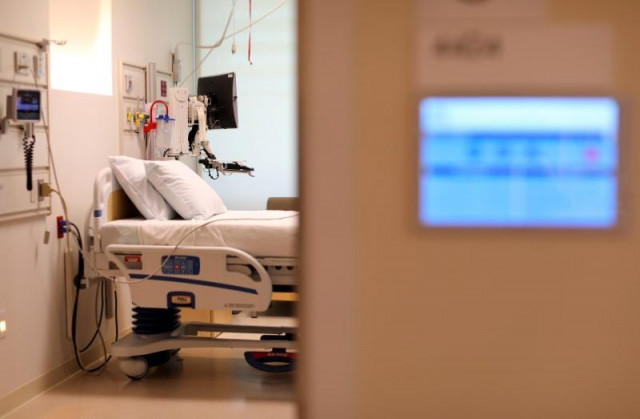The innovation desert
If we do not act, problems of health at our doorstep may no longer remain solvable

Representational image of a hospital. PHOTO: REUTERS
Let us be a bit more specific, and take a concrete example of one of the grandest challenges of our time in public health and analyse where we stand. One of the biggest issues facing not just Pakistan but all over the world is that of increasing rates of antibiotic resistance. Widespread misuse and abuse of antibiotics, a weak pipeline of new drugs and poor diagnostic capacity to differentiate between bacterial and viral diseases are all major challenges. The impact on Pakistan is already significant (eg, the presence of highly resistant Typhoid strain seen in Hyderabad and Karachi) and is likely to affect millions in the coming years. There is no hyperbole here — the problem is at our doorstep and is already impacting our hospitals.
These problems are ripe for innovation — ranging from diagnostic development to discovery. Yet, while our neighbouring countries (India, China and Iran) are pushing hard on these rapid diagnostics, and have shown some promising successes, nothing of substance has come from Pakistan. But when it comes to international awards, grants and prizes that are created to foster new innovations in antimicrobial resistance, Pakistan is simply not present. This is neither fake news nor a conspiracy — but a fact we have to own. Before we blame it on a particular political party, or expect the honourable judges to use their magic wands, it may be worthwhile to remember that the problem of antibiotic resistance is a major threat in all provinces, and different political parties were in charge of the governments there. They are quick to thump their chests and argue that they have created the best possible incubators — but the impact of those may be on better choice for food or new designer clothes or a ride sharing app, but not on fundamental healthcare.
I have met hundreds of students and innovators and I remain somewhat optimistic. I still believe that it is not the lack of talent, but lack of awareness, dearth of mentorship and an absence of an enabling ecosystem that is the barrier. Innovation in diagnostics is one aspect of the challenge, the weak R&D in pharma is not helping much either. Further, with no clear policy on clinical trials, international partnerships fail to materialise.
So how do we change the status quo? I would start with three basic things which I think can unjam the system. First, creating true sense of awareness of the problem through critical thinking and public engagement. Second, providing real incentives that allow new stakeholders (eg, scientists, public health workers, clinicians and nurses) to come to the fore and third, a regulatory environment that simultaneously fosters innovation and emphasises patient safety. None of these are unsolvable problems — but if we do not act, the problems of health at our doorstep may no longer remain solvable.
Published in The Express Tribune, July 3rd, 2018.
Like Opinion & Editorial on Facebook, follow @ETOpEd on Twitter to receive all updates on all our daily pieces.















COMMENTS
Comments are moderated and generally will be posted if they are on-topic and not abusive.
For more information, please see our Comments FAQ